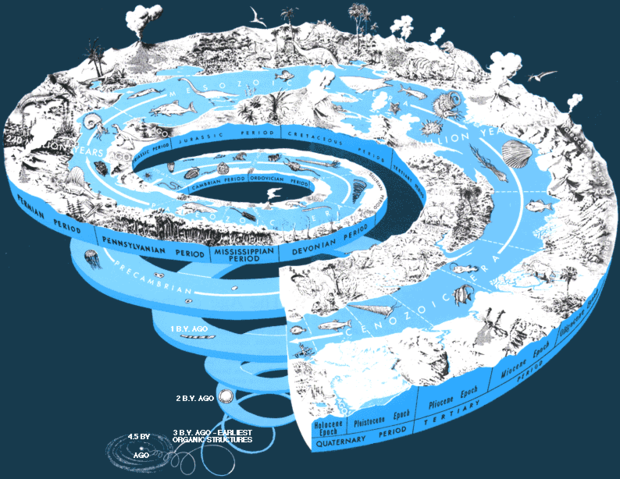From Wikipedia, the free encyclopedia
 Size of this preview: 620 × 479 pixels
Size of this preview: 620 × 479 pixels Full resolution (794 × 614 pixels, file size: 104 KB, MIME type: image/png)
 |
This is a file from the Wikimedia Commons. The description on its description page there is shown below.Commons is a freely licensed media file repository. You can help.
|
Source
- Publication
- Geological time, online edition. Version 1.2 . Last updated December 11, 2000.
- URL
- http://pubs.usgs.gov/gip/geotime/time.html
Original caption
The Earth is very old -- 4.5 billion years or more according to recent estimates. Most of the evidence for an ancient Earth is contained in the rocks that form the Earth's crust. The rock layers themselves -- like pages in a long and complicated history -- record the surface-shaping events of the past, and buried within them are traces of life --the plants and animals that evolved from organic structures that existed perhaps 3 billion years ago.
Also contained in rocks once molten are radioactive elements whose isotopes provide Earth with an atomic clock. Within these rocks, "parent" isotopes decay at a predictable rate to form "daughter" isotopes. By determining the relative amounts of parent and daughter isotopes, the age of these rocks can be calculated.
Thus, the results of studies of rock layers (stratigraphy), and of fossils (paleontology), coupled with the ages of certain rocks as measured by atomic clocks (geochronology), attest to a very old Earth!
 |
This image is in the public domain because it contains materials that originally came from the United States Geological Survey, an agency of the United States Department of Interior. For more information, see the official USGS copyright policy |
|
File history
Click on a date/time to view the file as it appeared at that time.
|
|
Date/Time |
Dimensions |
User |
Comment |
| current |
22:41, 2 March 2007 |
794×614 (104 KB) |
Pengo |
|
File links
The following pages on Schools Wikipedia link to this image (list may be incomplete):

